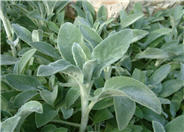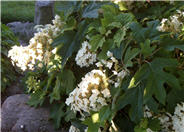
Common name:Lamb's Ear
Botanical name:Stachys byzantina
This tiny shrub will grow less than 1' tall and has medium-size, greyish-green leaves with blue and lavender flowers that bloom in the spring. This shrub is grown more for its velvety leaves than the flowers. It is drought tolerant once it's established. Be careful not to overwater.

Common name:Dwarf Oakleaf Hydrangea
Botanical name:Hydrangea quercifolia 'Pee Wee'
An upright shrub with large maple-like, green deciduous leaves that turn bronze in fall. It has a very graceful form with attractive white flowers in the spring that fade to pink. This shrub prefers partial sun and regular watering, more in summer. It reaches 4' tall and 3' wide. Prune in winter to keep it tidy.

Common name:Butterfly Iris or Fortnight Lily
Botanical name:Dietes iridioides
This clumping evergreen iris bears tall, narrow leaves to 30" tall and white flowers marked purple in the center on stalks to 3' tall, appearing spring through fall. This variety has stiffer, darker foiliage than the bicolor form. It requires sun to part shade with little or no summer watering when established. This is a very reliable plant. Divide every 3-5 years to keep it looking fresh.

Common name:Evergreen Clematis
Botanical name:Clematis armandii
A climbing evergreen vine, this Clematis may reach a size of 20'-30'. Its dark green, slender leaflets have a leathery texture, and produce fragrant, showy white flowers in the spring. It tolerates sun or part shade, drought, moist soil, and prefers shade around its roots. It attracts beneficial insects and hummingbirds.
- Cornflower Farms
| Designer: | Table and Wicker Chairs |
Photographer: GardenSoft |
Soils and Compost:
Incorporate compost 6" into your soil to retain water, reduce compaction, feed earthworms, and provide valuable nutrients to your plants.
Water Saving Tip:
Check the soil's moisture level before watering.
You can reduce your water use 20-50% by regularly checking the soil before watering.
Integrated Pest Management:
Remove irrigation water and fertilizer from areas where you don't want weeds to grow.
